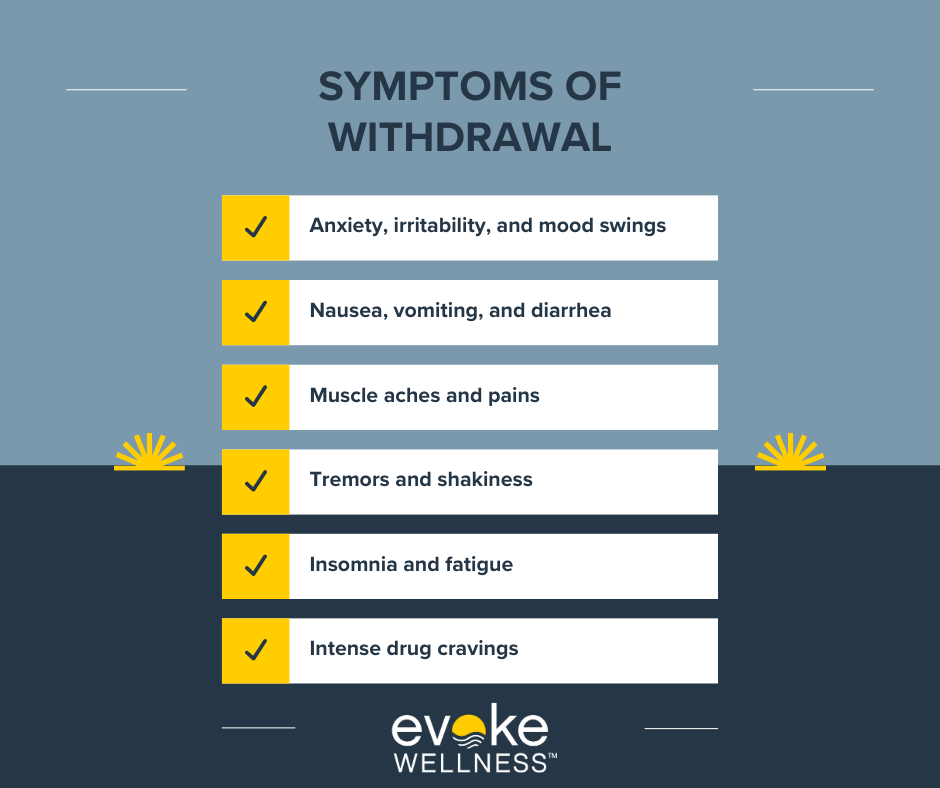Understanding the detox process is crucial when seeking treatment for substance abuse. As you embark on your recovery journey, knowing what to expect during detoxification can help alleviate anxiety and prepare you for the challenges ahead. This article will explore the detox timelines for various substances, including alcohol, opioids, and stimulants. We’ll examine the latest research on medical detox protocols, highlighting the importance of professional supervision during this critical phase. You’ll gain insights into the specific detox processes for substances like fentanyl and crack cocaine, which present unique challenges. By the end, you’ll have a comprehensive understanding of detox timelines and be better equipped to make informed decisions about your treatment options.
Together, let’s embrace the journey to recovery and the promise of a new beginning. Call us at (833) 819-6066 today or reach out online.
What Is Drug Withdrawal?
Understanding the Basics
Drug withdrawal refers to the uncomfortable physical and psychological symptoms that occur when someone who has developed physiological dependence stops using a substance. According to the National Institute on Drug Abuse, withdrawal happens because the brain has adapted to the presence of the drug over time. When the drug is removed, the brain’s chemistry is thrown out of balance, leading to withdrawal effects.
Symptoms of Withdrawal
The specific withdrawal symptoms can vary depending on the substance involved, but common examples include:

Why Withdrawal Occurs
Withdrawal occurs because drugs like alcohol, opioids, and stimulants affect the brain’s neurotransmitter systems that regulate mood, sleep, appetite, and other functions. As explained by the Substance Abuse and Mental Health Services Administration, the brain attempts to maintain chemical homeostasis by compensating for the presence of the drug. But when the drug is removed, the brain remains in this altered state, producing withdrawal effects.
Can Withdrawal Be Lethal?
In some cases, yes – withdrawal from certain substances like alcohol and benzodiazepines can potentially be life-threatening without proper medical management. That’s why medically supervised detox under the care of trained professionals is crucial for managing severe withdrawal safely and mitigating risks like seizures, delirium tremens, and other complications. With comprehensive support, the detox process can be navigated successfully as the first step toward lasting recovery.
Drug Withdrawal Timelines: How Long Does Withdrawal Last?
Alcohol Withdrawal Timeline
Alcohol withdrawal can begin as soon as 6-8 hours after your last drink. Acute symptoms typically peak within 24-72 hours and may include tremors, nausea, anxiety, and sweating. Most alcohol withdrawal cases resolve within 3-7 days with proper medical detox support. However, some psychological effects like sleep issues and mood swings can persist for months.
Opioid Withdrawal Timelines
Withdrawal from opioids like heroin or prescription painkillers usually starts 12-30 hours after the last dose. Early symptoms like muscle aches, agitation, and insomnia arise first. Acute opioid withdrawal peaks around 72 hours with intense cravings, nausea, vomiting, and diarrhea. Most physical symptoms subside within 7-10 days, though psychological challenges may continue for weeks or months without comprehensive treatment.
Benzodiazepine Withdrawal Duration
Benzodiazepines like Valium and Ativan have notoriously difficult withdrawal syndromes. Mild symptoms like anxiety and insomnia can start within 24 hours after stopping use. Life-threatening effects like seizures may occur 3-4 days into benzo withdrawal without medical supervision. The full detox timeline can extend 10-14 days or longer for benzos’ prolonged half-lives.
Stimulant Withdrawal Timelines
Stimulants like cocaine and methamphetamine produce a relatively short acute withdrawal phase of 3-7 days. Early crash-like symptoms of fatigue, depression, and increased appetite emerge within hours. The most intense cravings and mood disturbances peak around 72 hours before gradually subsiding. Post-acute withdrawal effects like anxiety, anhedonia, and sleep problems can persist for several months.
While general timelines provide guidelines, numerous individual factors influence the severity and length of withdrawal for any substance. Seeking medical detox ensures around-the-clock care to manage dangerous symptoms and significantly improves the chances of completing the full continuum of addiction treatment.
What Are the Stages of Drug Detox?
The Withdrawal Timeline
As substances leave the body during detox, physical and psychological withdrawal symptoms emerge. The detox timeline typically follows this pattern:
- Early Withdrawal (6-12 hours): Initial mild symptoms like anxiety, insomnia, muscle aches, and drug cravings appear.
- Acute Withdrawal (12-72 hours): More intense effects peak around day 3, such as nausea, vomiting, tremors, agitation, and depression.
- Protracted Withdrawal (3-14+ days): While acute symptoms subside, some lingering effects like fatigue, mood swings, and sleep disturbances may persist.
Substance-Specific Challenges
The detox stages and symptoms experienced can vary significantly based on the substance abused:
- Opioids (Heroin, Fentanyl): Acute flu-like symptoms, muscle/bone pain, severe cravings. Risk of respiratory depression.
- Stimulants (Cocaine, Meth): Fatigue, depression, increased appetite, vivid dreams/nightmares.
- Alcohol/Benzodiazepines: Potentially life-threatening effects like seizures, DTs (delirium tremens), high blood pressure.
- Marijuana: Irritability, depression, sleep/appetite disturbances.
The Value of Medical Detox
Attempting to detox alone can be extremely dangerous, especially with alcohol, opioids, or benzodiazepines. A professional medical detox program provides:
- 24/7 supervision by healthcare staff to monitor vital signs
- Medications to manage withdrawal symptoms and reduce risks
- Supportive care for hydration, nutrition, and comfort measures
- Transition to therapy to address root causes of addiction
With comprehensive, evidence-based care, medical detox greatly improves the safety and success of the recovery journey.
What Is the Timeline of Drug Withdrawal?
Alcohol Withdrawal
- Early symptoms (8-24 hours): Anxiety, insomnia, nausea, abdominal pain
- Peak symptoms (24-72 hours): Hallucinations, fever, seizures
- Improvement (5-7 days): Most physical symptoms subside
Heroin & Opioid Withdrawal
Withdrawal from heroin and prescription opioids like oxycodone follow a similar timeline:
- Early (8-24 hours): Muscle aches, agitation, anxiety
- Peak (72 hours): Diarrhea, nausea, abdominal cramps
- Subsiding (7-10 days): Cravings and depression may persist
Benzodiazepine Withdrawal
Withdrawal from benzos like Xanax or Valium can be potentially life-threatening without medical supervision:
- Early (1-4 days): Insomnia, anxiety, hand tremors
- Peak (10-14 days): Seizures, psychosis, depression
- Improvement (15-28 days): Most acute symptoms resolve
Stimulant Withdrawal
Withdrawal effects from cocaine, meth or prescription stimulants include:
- Crash phase (9-72 hours): Depression, fatigue, increased appetite
- Acute phase (3-8 weeks): Cravings, irritability, anhedonia
- Prolonged phase: Anxiety, dysphoric mood may persist months
The detox timeline can vary significantly based on factors like the substance, frequency of use, co-occurring disorders and individual physiology. Medical detox under clinical supervision provides a safe, controlled environment to manage often severe withdrawal symptoms.
What Is the
Detox Process
The detox process refers to the safe and medically supervised removal of addictive substances from the body. During detox, individuals experience withdrawal symptoms as their systems adapt to functioning without drugs or alcohol. The duration and severity of withdrawal can vary significantly based on factors like the type of substance, length and severity of addiction, and individual physiology.
Physical & Mental Effects
Detox triggers intense physical and psychological effects as the brain chemistry is disrupted. Common withdrawal symptoms include nausea, tremors, anxiety, insomnia, and intense cravings. In severe cases, complications like seizures or delirium tremens (DTs) can occur, underscoring the importance of professional medical detox with around-the-clock monitoring.
Individualized Care
At Evoke Wellness, detox programs are tailored to each client’s unique needs. Medical professionals carefully evaluate the type of substance(s), level of dependence, and any co-occurring mental health conditions to create a personalized treatment plan. This comprehensive approach ensures a safe, comfortable detox experience while preparing the individual for the next phase of addiction treatment and counseling.
Continuum of Care
While detox is a crucial first step, it is only the beginning of the recovery journey. Comprehensive addiction treatment, including counseling, behavioral therapies, and aftercare planning, is necessary to address the root causes and develop coping strategies for long-term sobriety. Evoke Wellness provides a full continuum of evidence-based care to support clients throughout every stage of recovery.
Conclusion
Understanding the detox timeline for different substances is crucial for anyone considering treatment. As we’ve explored, the process varies significantly depending on the substance and individual factors. Medical detox provides a safe, supervised environment to manage withdrawal symptoms and complications. Whether you’re facing drug and alcohol detox, fentanyl detox, or crack cocaine detox, professional support is essential.
Recent studies show that medically supervised detox can increase treatment completion rates by up to 70%. By choosing a reputable facility like Evoke Wellness at Miramar, you’re taking the first step towards lasting recovery. Remember, detox is just the beginning of your journey. With the right support and commitment, you can overcome addiction and reclaim your life.
Begin Your Journey with Evoke Wellness at Miramar
If you or a loved one is considering treatment, Evoke Wellness at Miramar invites you to contact us. Our compassionate team is ready to answer your questions, discuss your needs, and help you take the first steps toward recovery. In Miramar, you’ll find more than just a treatment program – you’ll discover a community dedicated to your wellness and success. Together, let’s embrace the journey to recovery and the promise of a new beginning. Call us at (833) 819-6066 today or reach out online.


